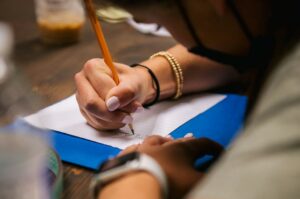Two Teachers Are Working to Create AP U.S. Women’s History
Originally published by Nadra Nittle for the 19th
“How can young women really see their value if they don’t see their place in history?”
That’s the question Kristen Kelly, a teacher at Sacred Heart Preparatory in Atherton, California, asked herself a decade ago after struggling to find a high school textbook that meaningfully engaged women’s contributions to history.
At the time, Kelly taught religious studies, and when she expressed her frustrations to Sacred Heart history teacher Serene Williams, she learned that they both shared the same concern. So, the two teamed up on an interdisciplinary women’s history class, creating a reader to accompany the coursework.
Now the women are on a mission to center women in high school history courses across the country. They are petitioning the College Board — the not-for-profit organization that administers Advanced Placement courses — to offer an AP U.S. Women’s History course. So far, they have collected nearly 2,000 signatures to that end.
The dearth of women’s political history in AP U.S. Government and Politics, which Williams has years of experience teaching, is a major reason the educator believes in the necessity of an AP course devoted solely to women’s contributions in the United States. That none of the foundational documents included in AP U.S. Government are written by women and few questions on the exam for the course are about women disturb both Williams and Kelly, who contend that the class should be more intersectional.
“I feel like it messages that women are not foundational to our political system,” Williams said.
Although Williams and Kelly’s concerns about women’s exclusion from high school history curricula go back over a decade, they did not set out to propose a standalone course on women’s history. After winning a 2022-23 Schlesinger Library Teaching Grant from the Radcliffe Institute for Advanced Study at Harvard University, the duo intended to conduct research at the Schlesinger Library that would support making AP U.S. Government more inclusive of women.
But when the College Board began to pilot new courses, particularly AP African American Studies — which rolled out this year despite objections from lawmakers in states such as Florida and Arkansas — the educators decided to campaign for AP U.S. Women’s History. They’ve been petitioning the College Board, making presentations with students about the proposed course and attending conferences to pitch the class, with plans to go to the College Board’s Advanced Placement Annual Conference next year.
The Women’s History in High School website created by Kelly and Williams outlines the subject matter their proposed course would include, and it’s far-ranging. It would begin by covering women’s roles in Indigenous societies before the Americas were colonized and would go on to cover the American Revolution, Seneca Falls, Manifest Destiny, the Civil War and the Gilded Age — all with women’s issues at the forefront. From there, the course enters the 20th century, examining both world wars, second- and third-wave feminism and the conservative backlash to feminism, before ending in the present day with a focus on contemporary women’s issues and trailblazers.
“The first wave of feminism is typically taught in high school from 1848, Seneca Falls, to 1920,” Williams said. “And if students learn anything about women’s political history, they typically learn it that way. So our course spends a lot of time talking about pre-1848, what women’s political authority in this land looked like. We talk a lot in this course about common law and how women actually lost political authority when the Constitution went into effect. We talk a lot about the impact of chattel slavery on women’s political bodies and regulation by the state.”
The course includes women from multiple ethnic, religious and political backgrounds as well as women who belong to the LGBTQ+ and disability communities. The sheer diversity of women named Phyllis (or a variation) in history is a case in point. There’s Phillis Wheatley, the enslaved poet who as a teen in 1767 became the first Black American to have her work published; Phyllis Schlafly, the White conservative who led a movement to block the Equal Rights Amendment in the 1970s; and Phyllis Lyon, the lesbian and marriage equality activist who died just three years ago.
